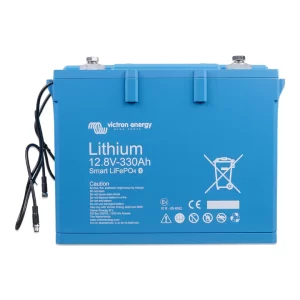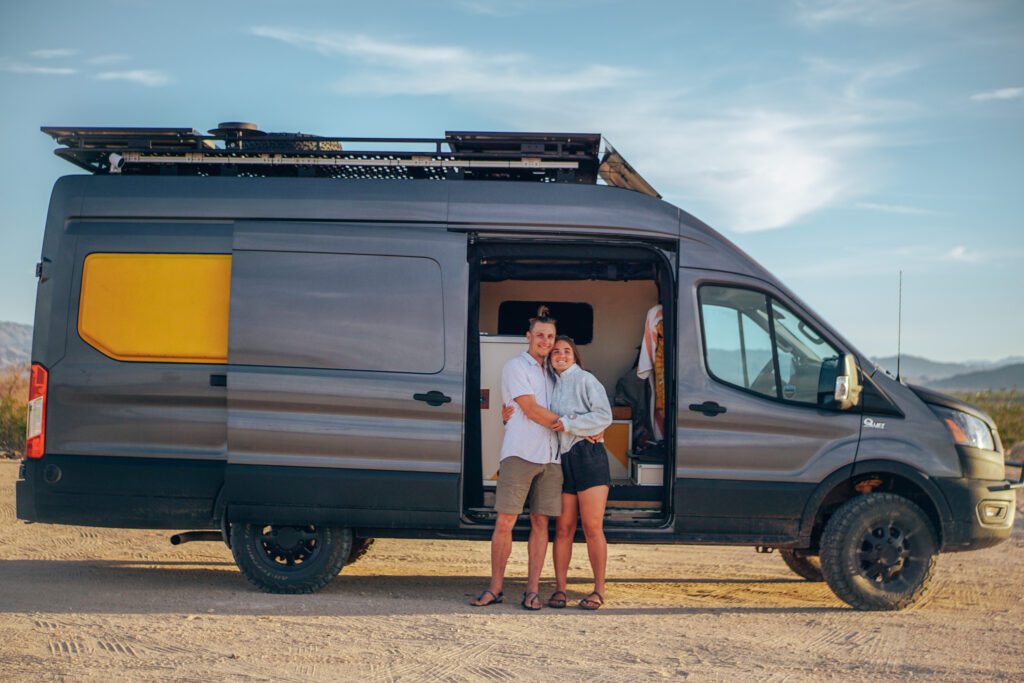Internal vs External Battery Management Systems (BMS) in Camper Vans
With Lithium Iron Phosphate batteries being the dominant choice for modern off-grid camper vans, understanding Battery Management Systems (BMS) is more important that ever. And, it is often overlooked when DIY-ing a camper van conversion. In this short guide, we will share everything you need to know.
BMS can either be built internally to an individual battery, such as with Battle Born Batteries, or can be a separate circuit board that monitors an entire battery array, such as with Victron Batteries.
In This Guide:
** Disclaimer: This blog post contains various affiliate links that provide a small kickback to us, at no additional cost to you. We truly appreciate your support if you choose to purchase through these! **
What is a Battery Management System (BMS)?
Let’s start at the beginning: what is a Battery Management System? All lithium batteries require careful monitoring and management for safety and longevity. This is of course crucial for the lifespan of your camper van electrical system. A good battery management system is built to ensure safe operating conditions of your lithium batteries to prevent unsafe or stressed operating conditions that can damage individual cells.
What does a BMS do?
The term BMS is a catch all and it’s important to understand that not all BMS are created equal. A good battery management has several key features:
- Voltage monitoring for the entire battery bank as well as individual cells
- Current monitoring and imposed limits at various charge levels
- Temperature sensing to prevent charge / discharge at designated extreme temperature points (some BMS have self heating functions as well)
- Whole system disconnect for emergency shutoff
- State of Health (SOH) monitoring to track battery lifetime
How does BMS apply to Camper Van Electrical Systems?
All of the above functions of BMS are crucial to your camper van electrical system health. However, the degree of BMS needed in a camper van depends on the size of your system and how you plan to use your system. In general, the greater the performance expectations are of your camper van house batteries, the more you will benefit from a higher quality external BMS. Greater performance expectations can include:
- Increased charge / discharge capacity
- Wider safe operating envelope
- Increased visibility and balancing of battery cells between multiple batteries in a battery array
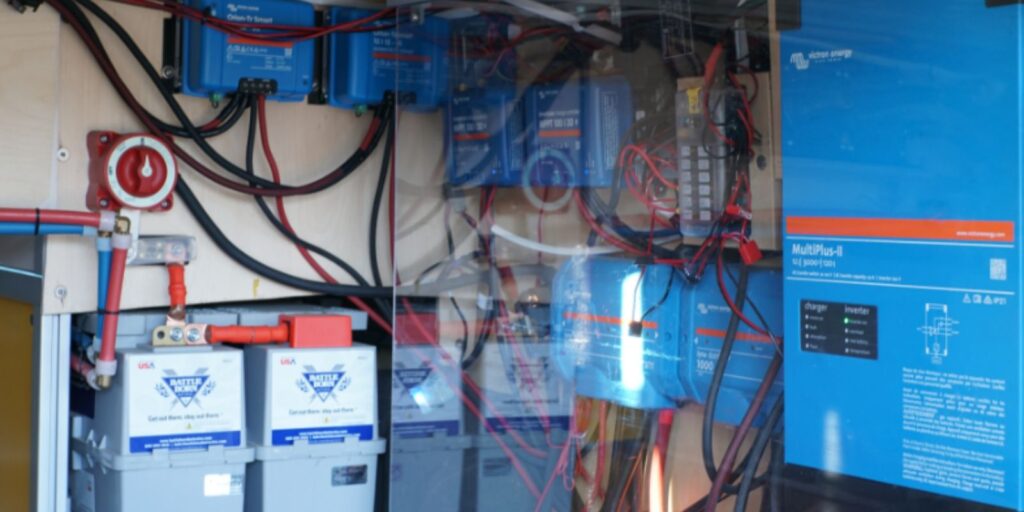
Internal Vs. External Battery Management Systems
Now, that we understand the importance of a Battery Management System, let’s delve into your two options: Internal and External BMS. Internal BMS are “drop in ready”, whereas external BMS require more set-up and customization to get up and running, but ultimately perform better.
Pros and Cons - Internal Vs External Battery Management Systems in Camper Vans
Both internal and external BMS suit different types of camper van conversions. Generally, larger systems will benefit more from external BMS. Here is a complete list of pros and cons to compare the two options and decide what might be best for your electrical system:
Internal BMS
Pros
- Easy – drop in ready
- No purchase, or install, of external unit
Cons
- Black box – can’t see what BMS is doing
- More BMS than needed if you have more than one battery
- Multiple BMS units (one per battery) take up more space and have to be replaced when the batteries are replaced
- Multiple batteries cannot “talk” to each other, so charge and discharge rate is limited
External BMS
Pros
- Fewer points of failure. One main BMS rather than several smaller ones per battery
- Space savings – as much as DOUBLE in terms of volume
- “Sees the whole battery bank” – Monitors individual cells between multiple batteries
- Increased charge and discharge rates
Cons
- Installation and cost of separate hardware
- More complex install
Which BMS should van lifers use?
So, how does this apply to van life? And, what van lifers should opt for external vs internal BMS?
Internal BMS
Internal BMS is ideal for van lifers who:
- Have smaller capacity battery banks
- Have no more than two batteries as part of their whole battery bank
- Are not frequently expecting high charge or discharge rates (Below 0.5 * Capacity for max lifetime)
External BMS
External BMS is ideal for van lifers who:
- Have large battery banks
- Have many batteries to balance and monitor (more than 3)
- Frequently expect high charge and discharge rates of their batteries (Above 0.5 * Capacity)
For size and weight comparison:
- A 12V 270ah GC3 LiFePO4 battery from Battle Born (internal BMS) is 81 pounds and has the dimensions ~ 23 × 7 × 13 inches.
- A 12V 330ah LiFePO4 battery from Victron (external BMS) is 66 pounds and has the dimensions ~ 14 x 8 x 10 inches.
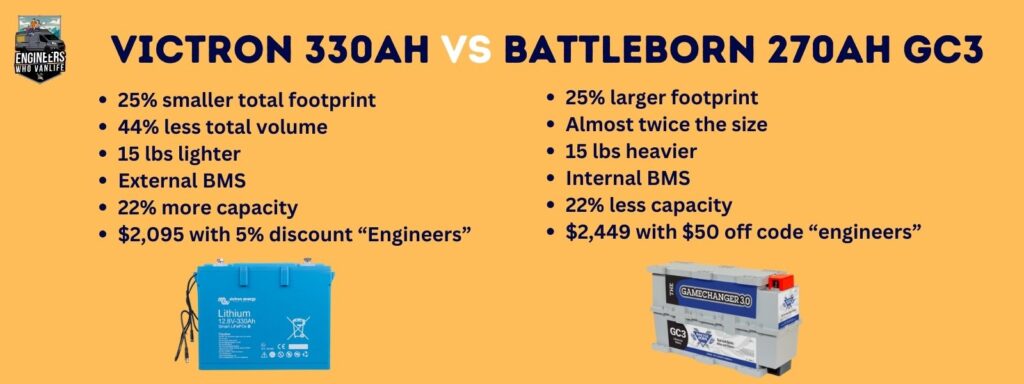
BMS Options For Camper Van Electrical Systems
There are two main players in the game for camper van Battery Management Systems that we recommend, Battle Born for internal BMS and Victron for external BMS.
Internal BMS Systems For Camper Vans (Battle Born)
The industry leader for batteries with internal BMS is Battle Born Batteries. Their internal BMS has temperature, voltage, and current sensing along with an emergency shutoff in the case of a short. The only feature you don’t get with these batteries is the ability for multiple batteries to “talk” to each other, thus limiting your charge and discharge rates as discussed above.
For many simple to moderately complex camper van electrical systems, this limited charge or discharge rate is not an issue.
Battle Born Batteries
All of Battle Born Batteries have an Internal BMS.
DISCOUNT: $50 off with code “engineers”
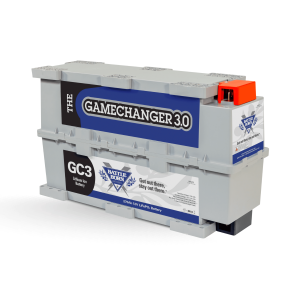
External BMS Systems For Camper Vans (Victron)
The industry leader for batteries with external BMS is Victron Energy. These batteries have truly amazing power densities, and if you’re already using Victron charging components (MPPT, DC-DC, etc), using their batteries just makes sense. Victron external BMS does everything Battle Born’s BMS does and then some:
- You can monitor multiple batteries in an array which gives extreme charging and discharging capability
- Additional array of communication and monitoring capabilities like integration to a Cerbo GX via RVC or CAN bus communication is possible
- Monitor everything from your smartphone from the Victron Connect App even getting information like State of Charge (SOC) and State of Health (SOH)
A note on purchasing anything Victron: choose your supplier wisely! For something as important as your electrical system, you should aim to select a supplier who will provide excellent customer service for your questions while installing and who will have your back should something go wrong. Amazon buyers beware! We have vetted a plethora of sellers and have partnered with Unaka Gear as our endorsed supplier. We have also worked with them to bring you a 5% discount code: “Engineers”.
Victron BMS Options
Victron BMS are rated in terms of max current (amps). Think, charge / discharge rate.
DISCOUNT: 5% off with code “Engineers”
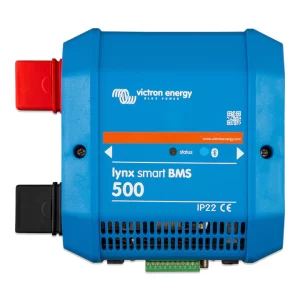
Can You Get Battle Born Batteries and Use Victron's External BMS?
No. The Victron smart batteries have built in M8 voltage sensing cables that plug into the Smart BMS module. This is their only way to “communicate” with the batteries, and because Battle Born Batteries have internal BMS, they do not include these communication cables in their batteries.
Can You Use Victron BMS With Generic Lithium Batteries?
No. The Victron Smart BMS is only compatible with Victron Batteries. For the BMS to function correctly, they must be plugged into the Victron M8 battery communication cables coming out of all Victron smart batteries.
Learn More about Camper Van Electrical Systems
BMS is only a small piece of camper van electrical systems. We have in depth guides to everything else you need to know from the basics, to selecting the right components, and protecting your electrical system on the road. All of our other guides are linked below. Happy building!
Thanks for being here! Happy building!
Eric + Colby
✉️ Join our mailing list for more content!
🙏🏽 If you are looking for more 1:1 van build help, we are here to help via Consulting or Travel Van Building.
[Start Here] Beginner Guides:

